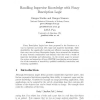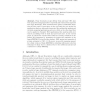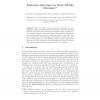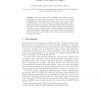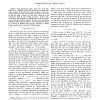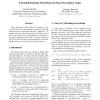121
click to vote
DLOG
2006
15 years 3 months ago
2006
Fuzzy Description Logics have been proposed in the literature as a way to represent and reason with vague and imprecise knowledge. Their decidability, the empirically tractable an...
125
click to vote
OWLED
2007
15 years 3 months ago
2007
Fuzzy Description Logics (Fuzzy DLs) and fuzzy OWL have been proposed as languages able to represent and reason about imprecise and vague knowledge. Such extensions have gained con...
124
click to vote
EUSFLAT
2007
15 years 3 months ago
2007
Fuzzy Description Logics (fuzzy DLs) have been proposed as a language to describe structured knowledge with vague concepts. In [23], a solution based on Mixed Integer Linear Progr...
126
click to vote
DLOG
2007
15 years 4 months ago
2007
Abstract. Fuzzy Description Logics (f-DLs) have been proposed as formalisms capable of capturing and reasoning about imprecise and vague knowledge. The last years, research in Desc...
139
click to vote
WILF
2005
Springer
15 years 7 months ago
2005
Springer
Abstract. This paper is a first step in the direction of extending possibilistic planning to take advantage of the expressive power and reasoning capabilities of fuzzy description...
109
click to vote
SEMWEB
2007
Springer
15 years 8 months ago
2007
Springer
Classical ontologies are not suitable to represent imprecise nor uncertain pieces of information. Fuzzy Description Logics were born to represent the former type of knowledge, but ...
167
click to vote
RR
2007
Springer
15 years 8 months ago
2007
Springer
Abstract. This essay describes fuzzy CARIN, a knowledge representation language combining fuzzy description logics with Horn rules. Fuzzy CARIN integrates the management of fuzzy l...
120
click to vote
FUZZIEEE
2007
IEEE
15 years 8 months ago
2007
IEEE
— Fuzzy Description Logics (fuzzy DLs) have been proposed as a language to describe structured knowledge with vague concepts. It is well known that the choice of the fuzzy operat...
127
click to vote
ISDA
2009
IEEE
15 years 8 months ago
2009
IEEE
Fuzzy Description Logics (DLs) are a family of logics which allow the representation of (and the reasoning within) structured knowledge affected by vagueness. Although a relativel...
